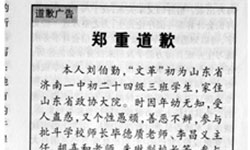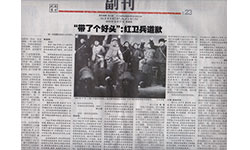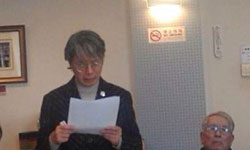HOME >> CHINA
Red Guard atones for criminal past in hopes for better future
Source:Globaltimes.cn Published: 2014-1-14 16:34:00
| Editor's Note |
The Cultural Revolution (1966 – 76) was a nightmare that continues to this day in the hearts of those that experienced it first hand. It is also part of a dark past that China must face. Many numbered among the Red Guards committed heinous crimes, yet only several have apologized to their victims publicly. Only when individuals stand up and bravely admit to their faults can we avoid making the same mistakes in the future.
| Comments |
● GT editorial
Red Guard apology triggers wide reflection
Song and Chen bravely making such individual apologies offers a chance for everyone in society to streamline their relationship with the Revolution. The launch of the Cultural Revolution was Mao Zedong's mistake, but it was also a mistake made by China as a group, where dishonor and shame of many individuals are also included. How to insist on integrity in a "chaotic" era should be another lesson that every Chinese needs to learn.
● It is still unclear as to whether Song Binbin's apology is mere ceremony or a call for those involved to bravely face and reflect on their past, Yang Gengsheng,a news commentator, said in an opinion piece published on ifeng.com.
Whatever the case, history and society are now bearing witness to those who committed crimes during that disastrous period 40 years ago attempting self-reflection, Yang commented.
● The Cultural Revolution saw passionate young people act against their conscience in a society that confused right and wrong and turned facts on their heads, Ren Dagang, a social commentator, wrote in the Shanghai-based Oriental Morning Post on January 14.
Many chose to keep silent afterwards despite their heavy hearts, wrote Ren, who echoed Song in saying, "If we do not apologize to the victims now, we may never have the chance."
Ren added that although time can heal physical wounds, emotional trauma can only be healed through recognizing and apologizing for past mistakes. This is the only way to find peace.
● While Song Binbin still remains a controversial figure, her call to reflect on the mistakes made during that period is an important one, the Southern Metropolis Daily commented on its official microblog January 13.
Only those who personally experienced the Cultural Revolution and are brave enough to reflect on their past can piece together the truth. This truth will provide a basis for future introspection.
● Zhu Dake, professor and literary critic at the Culture Criticism Research Center at Tongji Unversity, commented on its microblog January 13 that albeit a little late, the long-anticipated apology from Song Binbin is worthy of praise.
Zhu argues, however, that ethically speaking, a personal apology only heals the one apologizing. "What China should expect is an apology from the system that allowed the Cultural Revolution to happen in the first place and can prevent this disaster from repeating in the future," writes Zhu.
| Who apologizes? |
| Backgrounder |
The Cultural Revolution, initiated and led by Mao Zedong swept all across China from 1966 to 1976. Leaders, teachers and revered intellectuals were humiliated, accused of being counter-revolutionary, and beaten by gangs of young people calling themselves Red Guards for Chairman Mao. Some of the victims committed suicide, others died from ill treatment.
Chinese authorities long ago admitted in general terms that the Cultural Revolution was a disaster for China. However, there has not been much further self-examination, except rehabilitating names of the many officials and ordinary people who were unfairly harmed.
| Related Reports |
Mao Zedong Thought remains relevant
Xi: Holding high the banner of Mao 'forever'
85% say Mao's merits outweigh his faults: poll
Multiplied Mao
In search of Mao
Posted in: Society



